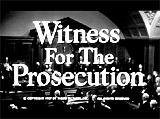
|
Witness for the Prosecution
(1957)
In co-writer and director
Billy Wilder's brilliant film, with crisp dialogue, a complicated
and intriguing plot, unique characters and excellent acting performances.
It was a convoluted, twisting courtroom drama-mystery adapted from
Agatha Christie's classic four-character short story "Traitor's
Hands," first printed in 1925 in the British magazine Flynn's, and
then published in the 1930s and 1940s in both the UK and US as "The
Witness for the Prosecution." It then became a celebrated
1953 stage play and murder mystery (in London and on Broadway):
- the setting was Britain in 1952, where an
aging, distinguished, crafty, near-retirement age London barrister/defense
attorney Sir Wilfrid Robarts (Charles Laughton) lived with his
overbearing housekeeper/nurse Miss Plimsoll (Elsa Lanchester, Laughton's
real-life wife) tending to his near-failing health for a weak heart;
they often playfully bantered together: (Sir
Wilfrid: "If
I'd known how much you talked, I'd have never come out of my coma!");
in one early scene, she revealed the forbidden
cigars (causing Sir Wilfrid's heart attack) smuggled in his cane
- the intelligently clever and incorrigible attorney
was asked by solicitor Mr. Mayhew
(Henry Daniell) to take on a perplexing case, the defense of a
prime murder suspect - an unemployed, American expatriate inventor
and poor war veteran named Leonard Stephen Vole (Tyrone Power in
his final film role); the seemingly-guileless Vole was charged
with the murder of elderly, childless, 56 year-old lonely, wealthy
widow Emily Jane French (Norma Varden); he had allegedly become
acquainted with her in order to acquire an inheritance (80,000
pounds) from her recently-changed will a week before her death
that made him her will's beneficiary; there was only circumstantial
evidence implicating him in the crime, and he had only one alibi
for the night of the murder - his wife Christine
- although it was something
not recommended by his doctors who wanted Sir Wilfrid to only take "bland
civil suits," he accepted the challenging and intriguing case
to take on Leonard's criminal defense after his arrest, believing
that there was the possibility that he was innocent
- Vole confessed to having only one alibi --
the testimony of his enigmatic, glamorous wife/lover Christine
Helm/Vole (Marlene Dietrich), an ex-East German beer hall performer/actress
in Hamburg (whom he had married after WWII), to defend him; she
would claim that she was home when he arrived at 9:26 pm, about
the time when Mrs. French was murdered in her home
- the testimony -- and true
identity -- of the mysterious, beautiful German-born 'wife' of
the accused, Christine "Helm" Vole,
held the key to solving the case involving marital infidelities
and deceit; she was Vole's only alibi - but she
could not, as the defendant's wife, be considered a very credible witness
(as the "wife of the prisoner")
- after Sir Wilfrid decided to take the case, the
dignified, strong-willed Mrs. Christine Vole/Helm made
a dramatic entrance in Sir Wilfrid's doorway to speak to him about
the case; she could not, however, as the defendant's wife, be considered
a credible witness
- during the trial in the Old Bailey, Sir Wilfrid
was shocked when Christine was called to the stand by the prosecution
as a "surprise
witness" - she said that she could provide evidence against
her 'husband' Leonard Vole. She vowed that she had to tell the
truth about Leonard's guilt: "I
cannot go on lying to save him"
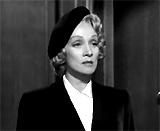 Witness for Prosecution Against Her Husband
Witness for Prosecution Against Her Husband
|
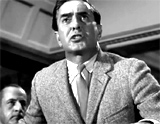 Leonard: "It's not true. You know it's
not true!"
Leonard: "It's not true. You know it's
not true!"
|
- Christine was able to testify against Leonard, because
he wasn't actually her legal husband - she had in fact already
married a German man named Otto Ludwig Helm in 1942 when she married
Leonard in 1945; Christine claimed that she was forced by Leonard
to provide a false alibi about his whereabouts and the timing of
his return (she claimed he had actually returned at 10:10 pm, although
Leonard had pressured her to say that he had returned at 9:26 pm);
Leonard had returned home with blood on his cuffs because he said
that he had cut his wrist, but he also admitted: "I
killed her" -- "It was that woman he had been seeing
so often"
- however, Christine was not
even a credible witness for the prosecution; when she was on the
stand, Sir Wilfrid accused her of habitually committing perjury
for much of her life: "The question is, Frau Helm, were you
lying then, are you lying now? Or are you not, in fact, a chronic
and habitual liar?"
- Sir Wilfrid would often use his monocle to extract
truth from potential clients by reflecting light blindingly into
their eyes
- soon after, the barrister
Sir Wilfrid was called to meet a mysterious Cockney woman who offered,
for a fee, to supply him with critical evidence against "that
German wife."
The woman on the phone said to meet him at the Euston train station
in 30 minutes: "If you want the lowdown on that German bag, get
yourself here." When they met, the vengeful, scarred, thick Cockney-accented
mystery woman offered Sir Wilfrid love letters that Christine had
written to a mysterious lover named Max (so she could get rid of
Leonard and be with him); the letters suggested that Christine was
actually having an affair - again confirming that she was an
unreliable witness
- during the meeting with Sir Wilfrid, she then proposed: "Wanna
kiss me, duckie?"
- and raised her hairline, to show disfiguring scars on the right
side of her face, deep cuts inflicted by Christine's new lover/boyfriend
Max who turned against her when Christine stole him away. Now, she
was getting her revenge ("cold-blooded vindictiveness")
by turning over the letters
- when the trial resumed, Sir Wilfrid called Christine to the stand and
confronted her with the letters recently written to Max (with evidence
she was on "intimate terms"), to prove that she had lied
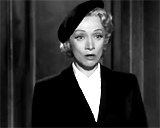
|
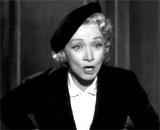
|
|
Christine Recalled to the Stand - To Be Proven
a Liar
|
- one of the damning letters was read
outloud for the jury by Sir Wilfrid: "My
beloved Max, an extraordinary thing has happened. All our difficulties
may soon be solved. Leonard is suspected of murdering the old
lady I told you about. His only hope of an alibi depends on me
and me alone. Suppose I testify he was not at home with me at
the time of the murder, he came home with blood on his sleeves,
and that he even admitted to me that he'd killed her? Strange
isn't it - he always said that he would never let me leave him.
But now, if this succeeds, he will be leaving me because they
will take him away forever and I shall be free and yours, my
beloved. I count the hours until we are together. Christine."
- Christine broke down on the
stand and admitted: "I wrote the letter." Therefore, she
had lied in earlier testimony for the prosecution. Having proven
Christine to be a liar and unreliable witness who committed perjury,
Leonard was declared 'not guilty' by the jury
- after the case was closed in the film's startling,
surprise courtroom scene ending, Christine admitted to Sir Wilfrid
that her strategy as a "witness
for the prosecution" had
worked. She explained that the only way to absolutely guarantee her
husband's acquittal and get her guilty husband off the hook was to
become a "witness for the prosecution" - something Sir
Wilfrid had advised her to do: "Remember
when I came to see you, and you said that no jury would believe an
alibi given by a loving wife, no matter how much she swore her husband
was innocent? That gave me the idea...The idea that I should be a
witness, not for my husband, but for the prosecution. That I should
swear Leonard was guilty and that you should expose me as a vicious
liar because only then would they believe Leonard was innocent"
- then came one of the film's plot twists -- she
revealed that she had masqueraded as the Cockney woman by repeating
her accent to Sir Wilfrid: "Wanna kiss me, duckie?" Christine
said that she was disguised as the Cockney woman who devised the
ploy of love letters to get Vole acquitted; she explained to him
that her all of her fraudulent letters and lies about Max (who
didn't exist) were the only way to have the jury believe that Leonard
was innocent
- but then, in the shocking
ending, a second, ultimate twist was revealed - the acquitted
Leonard was actually guilty of Emily French's murder; the
defendant, who entered and hugged Christine, was gloating about
his solid verdict to Sir Wilfrid, and how the 'double jeopardy'
ruling protected him: "You
got me off and I can't be tried again for this." Obviously,
Leonard had indeed murdered the elderly wealthy woman - the suspected
charge that was made against him from the very start
- with his newfound inheritance, Leonard said he
would take care of everyone (including paying for Christine's
perjury defense) - and then he admitted another major double-cross;
he had been unfaithful and was philandering with Diana (Ruta Lee)
- and she arrived in the courtroom to run away with him on a cruise:
("I'm
his girl!")
- flabbergasted and shocked,
Christine cried out: "Don't,
Leonard! Don't leave me!" And then, in furious anger, and
in the film's most shocking moment, Christine stabbed Leonard to
death in the stomach for his double-crossing
philandering with Diana
- this climactic murder was followed by Sir Wilfrid's
classic line when he corrected his nurse Miss Plimsoll about the killing: "Killed
him? She executed him." Sir
Wilfrid would now serve as Christine's defense lawyer
|
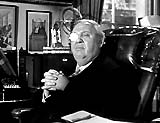
Sir Wilfrid Robarts (Charles Laughton)
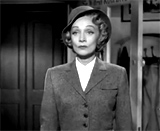
Christine Helm/Vole (Marlene Dietrich)
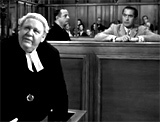
Sir Wilfrid in the Courtroom
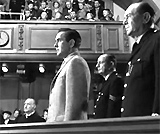
Leonard Vole (Tyrone Power): Charged With Murder

Phone Call from Cockney Woman to Sir Wilfrid From Train
Station
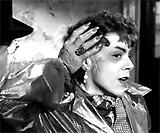
"Wanna kiss me, duckie?"
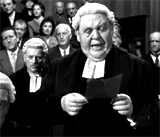
Sir Wilfrid Reading Christine's Love Letter
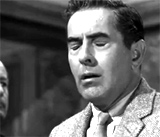
Leonard's Relief at 'Not Guilty' Verdict
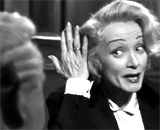
2nd Time: "Wanna kiss me, duckie?"
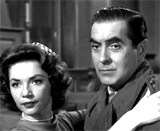
Diana (Ruta Lee) and Leonard
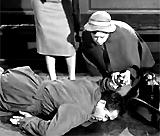
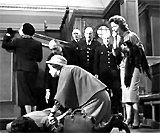
Leonard Stabbed to Death
|













